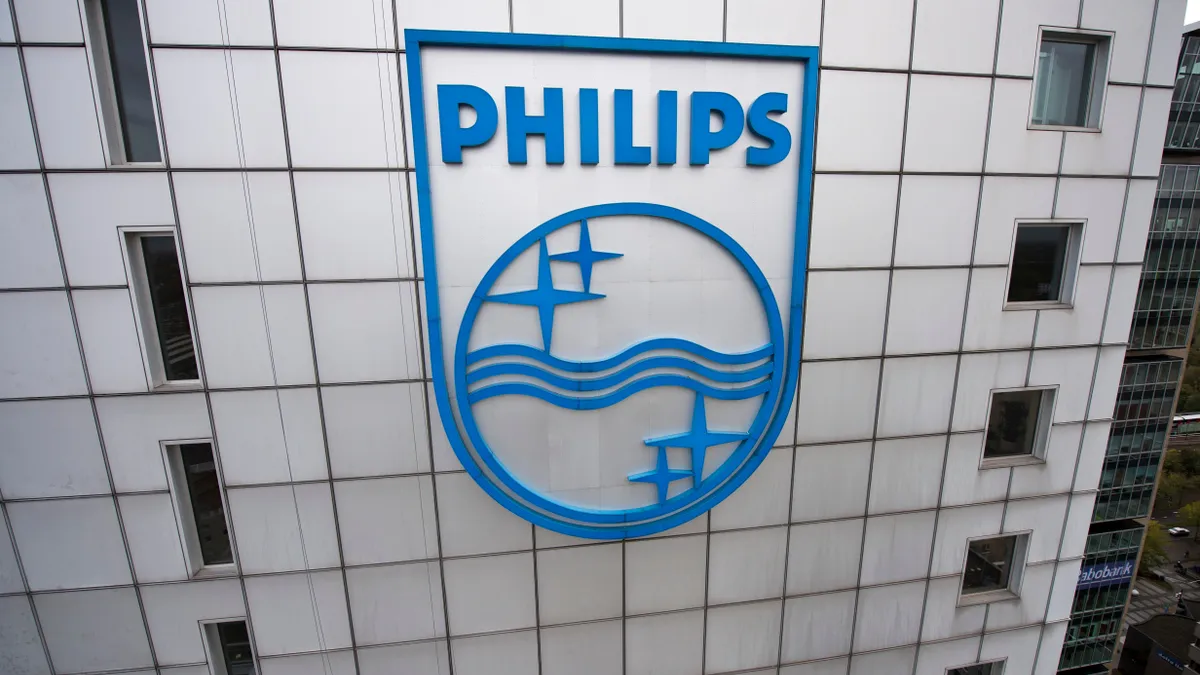Dive Brief:
- Philips aims to complete its DreamStation repair and replacement program in the fourth quarter of 2022, suggesting the recall of 5.2 million sleep devices will remain a headwind throughout much of this year. The company's shares fell about 4% in Monday morning trading on the news.
- The recall contributed to a 10% fall in comparable sales in the fourth quarter of 2021 and the increase in the number of impacted devices led Philips to raise its field action provision by €220 million ($249 million). Philips expects its sleep and respiratory care unit to drag full-year comparable sales growth down from one to two percentage points.
- With the recall sparking a wider review of Philips' operations, the fallout has expanded to the Connected Care unit, which incurred provisions for quality actions of €74 million in the fourth quarter. Jefferies analysts in a note last week wrote that they "are now less confident a [FDA] warning letter can be avoided given a provision for 'quality actions and other matters in the Connected Care businesses'."
Dive Insight:
Philips shared some of the key financial details of its fourth quarter earlier this month. At that time, the Dutch company revealed an increase in the field action provision related to the Philips Respironics recall of around €225 million ($256 million) because of the higher volume of devices now needing remediation and increased supply chain costs.
The revised costing came after Philips expanded the scope of the recall to cover older devices "in alignment with the relevant competent authorities." The expanded recall affects 5.2 million devices, up from the earlier estimate of 3 million to 4 million devices.
In its full fourth quarter results, Philips largely reaffirmed the recently released figures, while dropping its additional field action provision a touch to €220 million, and expanding on the next steps for the recall, its ongoing impact on operations and its response to the Form 483 issued late last year by FDA following an inspection of a Philips Respironics manufacturing facility.
"We have submitted a comprehensive response to the November 2021 Form 483 as well as a detailed action plan to the FDA," Philips CEO Frans van Houten said on a conference call with investors to discuss the fourth quarter results. "We have been able to increase production for the recall significantly. We are currently running at a triple rate versus last year. We have a further intent to raise that."
The recall continued to make progress in the fourth quarter. As of today, Philips has produced around 1.5 million repair kits and replacement devices, around 750,000 of which have reached customers. Since the third quarter, the number of kits and devices produced has doubled and the number that have reached customers has tripled.
Philips is racing to fix the situation as quickly as possible to prevent its main competitor, ResMed, from stealing its customers amid the disruption. However, the speed of the response is being limited by supply chain problems that are affecting Philips, the wider medtech sector and other industries. Van Houten cited supply chain headwinds as the cause of lower sales in multiple business units.
"We are from time to time confronted with suppliers who decommit and/or postpone deliveries," the CEO said. "Similarly with port congestion and supply chains. A typical example is how batteries were stuck on a boat on the west coast of the United States, basically delayed by five weeks or so, holding up our ultrasound production, and not being able to get that to our customers."
Van Houten dismissed the suggestions of analysts that the Respironics recall is linked to the wider supply chain recall, or that the volatility is specific to Philips and resulting in the loss of business to competitors.
"I have not seen any indication that customers are taking this out on us. We have not lost a single order," van Houten said. "I am actually aware that some competitors also tell customers long lead times for new orders to be delivered. So, I don't think we are unique in this actually, despite what you said."
Yet, the fallout from the Respironics recall is extending beyond DreamStation devices in other regards. The DreamStation problems prompted Philips to step up scrutiny of quality and patient safety across the business, leading to the provision of €74 million for quality actions at the Connected Care unit.
"As we are currently still in the process of informing stakeholders, I cannot provide details right now," van Houten said. "While the provision is sizable, we believe the mitigation of these issues is well understood. The business that it relates to are small business lines in the Connected Care portfolio."










